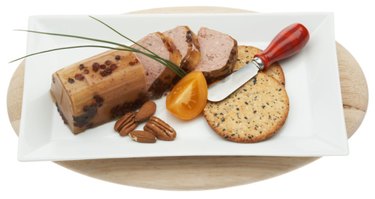
Hog head cheese is a jellied loaf usually eaten in thin slices as an appetizer. It is made from the head of a pig, but can include other pig parts such as the feet and tongue. Though there are various types of this product, the basic ingredients are the same.
Primary Ingredient
Video of the Day
The primary ingredient of hog head cheese is the head of a pig. Some recipes also call for the use of other parts of the pig. The head is cleaned, then simmered. Real Cajun Recipes advises chefs to discard the eyes, brains, and ears before cooking the head. The head of the pig is ready for the next step in the head cheese recipe when the liquid is cooked down into gelatinous broth and the meat readily falls off the bones.
Video of the Day
Ingredients to Season the Meat
Hog head cheese contains seasonings and spices, though recipes vary depending on taste. Some common additions to the meat include salt, onions, garlic, parsley, black pepper and red pepper. Sage and green onions are also add-in options used to enhance the flavor of the hog head cheese. The simplest recipes suggest taking the meat, minus the bones, in your hands and manually mixing it with your choice of seasonings and spices.
Types of Hogs Head Cheese

Apple cider vinegar added to hog head cheese can cause a sweet-sour taste. This type of hog head cheese is also called souse or sulz. A Russian type of hog head cheese includes chunks of tongue in gelatin. Whatever type you choose to make, the final step before eating is to form a loaf out of the meat mixture and chill it thoroughly in the refrigerator.
Ensuring Proper Consistency
The jellied consistency of this cheese is created by the congealing of the cooked hog's head as it cools. Some recipes, however, suggest adding dissolved gelatin to the meat and seasoning mixture before chilling. This ensures the loaf sets properly.
Uses of Hog Head Cheese

Enjoy your hog head cheese on flavored crackers or saltines. If you want a Cajun treat, serve it with boudin, a mixture of rice, meats and seasoning stuffed into sausage casings. You may also choose to add it to scrambled eggs or bean dishes. Other uses for this versatile product are as a sandwich meat or eaten solo with a bit of olive oil and salt. Experiment with some of these options, or your own creations, to find the most satisfying ways to please your palate.